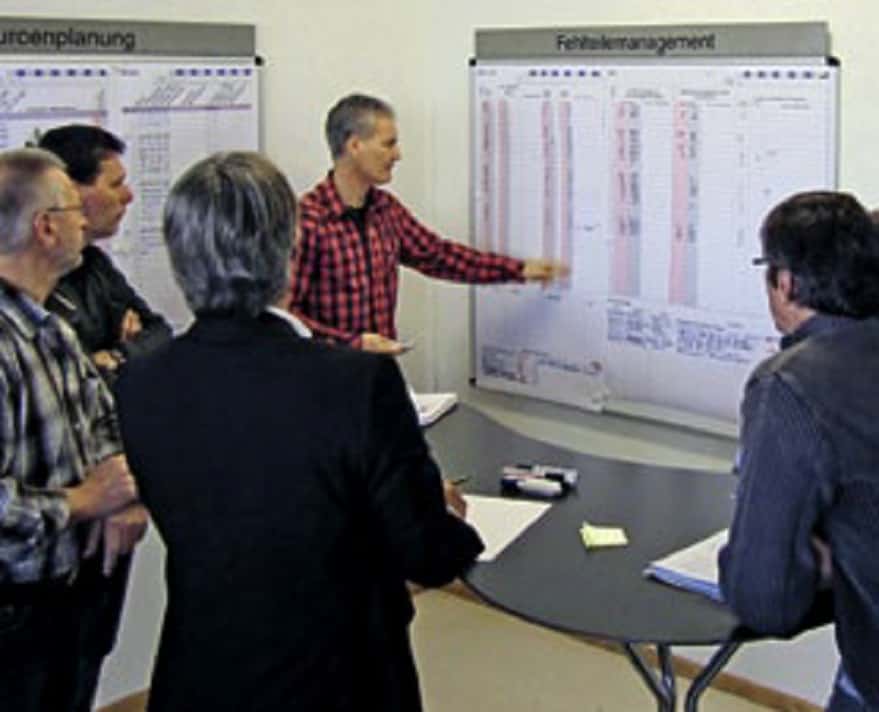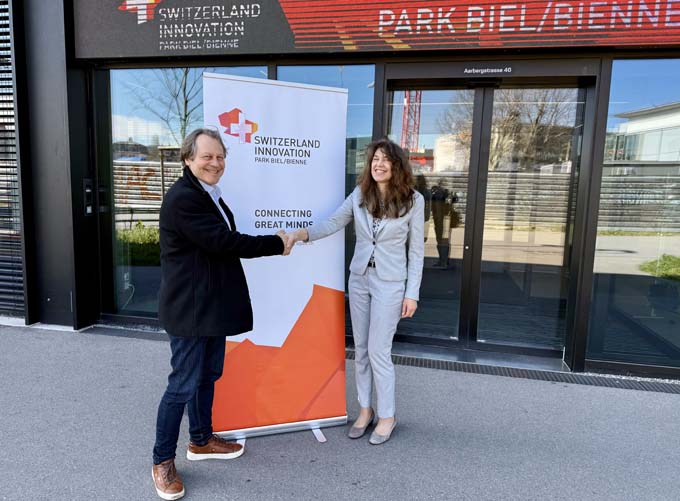Shopfloor Management
In order to bring human and economic benefits into the company, conventional improvement platforms often fall short and bring with them many disadvantages. That is why more and more companies are recognizing the need for shop floor management - a system that addresses company activities that preserve value in the long term.

Due to their competitiveness, companies are constantly on the lookout for potential savings. In order to draw not only on the ideas of managers, but also on the ideas potential of employees, the "company suggestion scheme" was developed many years ago as part of ideas management. In a classic company suggestion scheme, all employees in the company are addressed to contribute socio-technical improvements in the company.
The classic disadvantages of such systems are obvious: often complex administrative processes that are subject to review and approval and thus also require an incalculable period of time for implementation. Although these improvements are sometimes very attractively remunerated in monetary terms, in practice one often encounters er
CIP needs a breath of fresh air
sober states. Why? The answer is simple: anything that becomes a habit has a demotivating effect and the monetary incentive is no longer sufficient in our socio-technical systems, especially as it is still very often the case that these improvements are part of the job profile anyway.
CIP as a new approach
A continuous improvement process (CIP) is understood to be the systematic improvement of all company areas and processes by the employees. People are at the centre of the CIP, and everyone has the task of constantly questioning their own work processes and working environment and initiating improvements. This way of thinking came about not least as a result of the first lean wave in the 1980s. When the first pilgrimage of improvement managers returned from Japan, they were convinced that the new CIP approach would replace the classic systems. Unfortunately, this did not succeed to the extent hoped for, which is a sobering reality in many companies today. Very often one observes the situation that the so-called CIP boards remain empty or that the initial euphoria quickly cools down after introduction and training measures.
Go & See in shop floor management
Is it really the sole responsibility of an individual employee to drive process improvement? No. Successful sustainable improvement requires a management structure in which the manager assumes the role of mentor and thus supports the employees in their daily work, in recognizing the need for action and in setting priorities. What is meant here is a form of support that creates a working environment in which each and every person can optimally call upon their potential and deliver the best possible performance for the company.
These requirements are met by the so-called "Go & See", an important component of shop floor management (SFM). In the sense of Go & See, we control and
See facts at the source
the responsible manager obtains a picture of the current situation directly on site and at the same time acts as a mentor for the employees. This approach has the advantage that the manager knows his processes in detail and does not only rely on reports.
In addition to ensuring the continuous improvement process initiated by supportive management, regular structured dialogue takes place at Go & See between management and employees at all levels, which not least contributes to the promotion of social competence.
An example
Christoph Kunz, head of the Wetzikon plant at Kaba AG Switzerland, explains how Go & See works and what needs to be taken into account.
What experiences have you had with your company suggestion scheme?
We have installed a classic improvement process and have made the experience that this stagnates relatively quickly. Thanks to Go & See, we were able to activate many improvement suggestions in a very short time.
A few months ago, you launched your first shop floor initiative. How did your managers take it up?
Our leaders have recognized that there is still a lot that is hidden in the important value creation processes. Taking the time to change is the key to success. Our shop floor management is cascaded, supervisors in turn mentor team leaders, improvements that work have brought our CIP process back to life.
Aren't managers overburdened with the new role as mentors?
We prepare managers very carefully for their tasks. Intensive training sessions with specialists in shop floor management are used for this purpose. The methodological competence of the consultants is the decisive key.
Which measures are the focus?
As already mentioned, we train. For us, the training motto is basically: on site, on the product, in reality.
Go & See requires an intensive and continuous dialogue between the parties involved. How do you manage that?
Many small successes are increasingly contributing to a culture of communication that we did not have before. People talk about details and have dedicated themselves to shop floor management as a management task.
Wertfabrik actively supported your company in this process. With what results?
As the name of this consultancy suggests, they "create value" and this has been clearly demonstrated in our company over the last six months. Our consultant has developed his consulting expertise in
Who will take the company forward?
Conclusion - Employees need mentors
In the past, it has been shown that leaders are getting further and further away from the scene. In this regard, the author opines. Wolfgang Dörfler: "Many of the managers fail to ask their employees for ideas for existing problems, to conduct task-related conversations appropriately, and to provide their team with sufficient feedback on their work [...]." (Source: Development Dimensions International [DDI]) And this is where the Go & See in shop floor management comes in. Instead of dealing with administration and unnecessary bureaucracy, managers should rededicate themselves to value-creation processes and act as mentors to employees.









